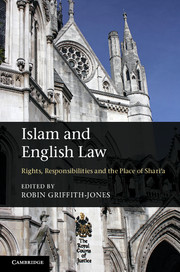Book contents
- Frontmatter
- Contents
- List of contributors
- List of abbreviations
- Preface
- Introduction
- Part I The Archbishop of Canterbury and shariʽa law
- Part II The Archbishop’s proposal for ‘transformative accommodation’
- Part III Responsibilities and rights
- Part IV Prospect: equality before God and before the law
- 19 Equal before God
- 20 Equal before the law
- Select bibliography
- Index of cases
- Index
19 - Equal before God
Published online by Cambridge University Press: 05 April 2013
- Frontmatter
- Contents
- List of contributors
- List of abbreviations
- Preface
- Introduction
- Part I The Archbishop of Canterbury and shariʽa law
- Part II The Archbishop’s proposal for ‘transformative accommodation’
- Part III Responsibilities and rights
- Part IV Prospect: equality before God and before the law
- 19 Equal before God
- 20 Equal before the law
- Select bibliography
- Index of cases
- Index
Summary
Reading through the chapters in this volume with a view to responding to it and looking to the future, I have been immediately struck by two things.
The first is the debt of gratitude owed to Rowan Williams, then Archbishop of Canterbury, for opening up the question of shariʽa in Britain in the way he did. It was courageous to face the issue so squarely in his 2008 lecture; in the media storm that followed, the basis for which is so helpfully described by Robin Griffith-Jones, even greater courage was required to hold his ground and respond so patiently and thoroughly to many critics. In retrospect, it seems the sort of statesmanlike contribution to public debate that few others could have made and that exemplifies a healthy way of addressing issues surrounding religion in the life of the nation. It is not that his way of handling the question of shariʽa in Britain can now, after the misrepresentations have been identified, be seen as uncontroversial; rather, he has placed the question firmly on the table in a way that, if one returns to his original lecture, helps to ensure that it can be debated with appropriate categories and concepts, and without the sorts of misunderstandings (not least about the nature of shariʽa ) that are widespread (even in pronouncements of the European Court of Human Rights (ECtHR)). Not least among the benefits of his lecture has been the impetus for drawing together the distinguished contributors to this volume, producing an expert, multi-faceted approach to the topic that should make it required reading far beyond Britain.
- Type
- Chapter
- Information
- Islam and English LawRights, Responsibilities and the Place of Shari'a, pp. 275 - 285Publisher: Cambridge University PressPrint publication year: 2013



